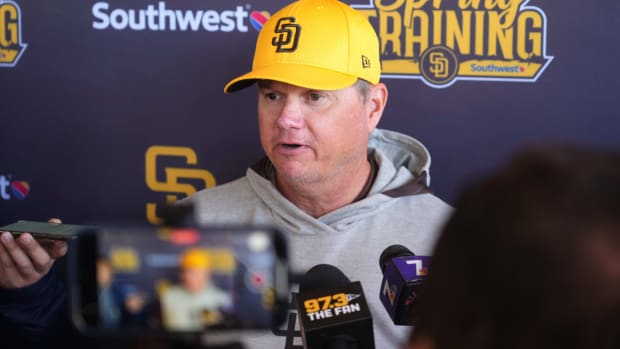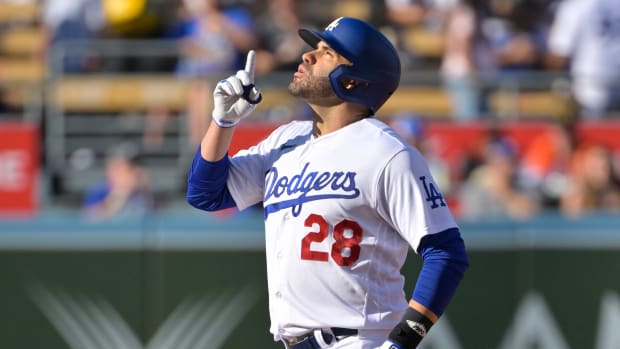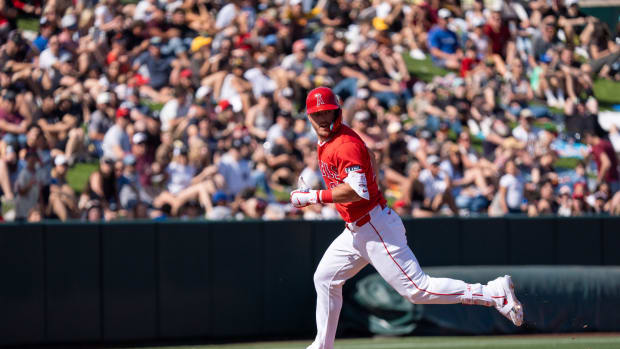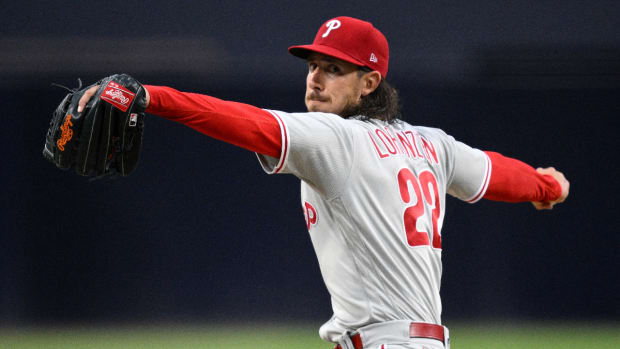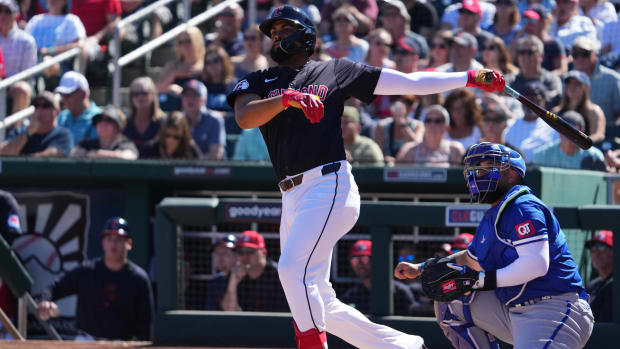Ranking traded starting pitchers by potential impact this season
Remember last year, when the Tigers and Athletics "won" the trade deadline by getting ace southpaws David Price and Jon Lester from the Rays and Red Sox, respectively? The talk was about a Detroit vs. Oakland ALCS. Those pitchers went a combined 10-9 after the trades (postseason included). Neither pitcher nor either team won a postseason game.
It’s a familiar story with hired guns. Over the past three years, contending teams have traded for 10 starting pitchers at or near the deadline, and only two of them paid off with even one postseason win: Jake Peavy (1–2 for the 2014 Giants) and John Lackey (1–0 for the '14 Cardinals).
The impact of trade deadline acquisitions when it comes to starting pitchers often doesn’t match the hype. We tend to remember the times when clubs do hit the jackpot, such as Doug Fister with the 2011 Tigers, Jeff Weaver with the '06 Cardinals and David Cone with the 1992 Blue Jays.
But hired guns are about taking a shot. The Astros can’t complain that Randy Johnson didn’t win a postseason game for them in 1998—he won 10 of his 11 regular-season starts with Houston and lost his two playoff starts while allowing three earned runs in 14 innings. Over the past three years, starters acquired at the deadline are 41–31 for their new team—remember Zack Greinke’s 6–2 contribution for the 2012 Angels?—but only 2–4 in the postseason.
Reyes, Shields, Utley lead top trade candidates for August waiver deadline
This trade deadline was significant for how many starting pitchers moved to contenders: nine of them, none of whom went to the Yankees. More teams are taking a shot. It's yet to be seen if teams picked up the next Matt Garza (4.38 ERA for the 2013 Rangers) or the next Peavy (2.17 ERA for the '14 Giants). But right now, here are the nine acquired starters ranked according to their potential impact this year:
1. Johnny Cueto, Royals: The best team in the league added an ace. The Royals have a historically great bullpen, but Cueto gives manager Ned Yost a new weapon: a starter who can own a game. Last year, Kansas City's starters in the postseason went 4–3 with a 4.12 ERA, made only five quality starts in 15 tries and never had more than six strikeouts in a game.
However, there are three warning signs to watch with Cueto: he is pitching in the AL for the first time after spending his entire career with the Reds; September is the worst month of his career (10–10 with a 3.81 ERA, though he was very good the past two Septembers); and he has never won a postseason game (0–2, 5.19 in three starts).
2. Scott Kazmir, Astros:
3. David Price, Blue Jays: Let’s be honest: Price’s value to Toronto comes down to four starts he's expected to make against the Yankees, currently set for Aug. 8 and 14 and Sept. 10 and 21. In six starts against New York over the past two years, he is 1–3 with a 7.59 ERA.
David Price shines in Blue Jays debut as Toronto shuts down Twins
In all, including his win Monday in his first start for the Blue Jays after being acquired from Detroit, Price figures to get 12 starts with Toronto and be in line to start either the Wild-Card Game or ALDS Game 1—if the Jays can end the longest active postseason drought in the majors, one that began immediately after winning consecutive World Series titles in 1992 and '93. For all of his moxie coming out of the bullpen as a rookie with the 2008 Rays, Price has never won a postseason start. He is 0–5 with a 4.98 ERA as a postseason starter, joining Aaron Sele (0–6), Charlie Leibrandt (0–5) and Doyle Alexander (0–5) as the only men to lose five times without a win in such games.
4. Cole Hamels, Rangers: As he proved with a no-hitter in his last start for the Phillies, Hamels is one of baseball’s best pitchers. Still, it’s hard to take the Rangers seriously as a contender when their starting pitching ranks 13th in the league and their bullpen ranks last. The staff ERA in July was 6.22, and yet they are two games out of the second wild card. I’m always wary of long-time NL pitchers transitioning to the AL, but Hamels is a long-term investment because he is signed through the 2018 season and has a club option for '19.
5. Mike Leake, Giants: San Francisco traded for a hot pitcher; Leake went 4–2 with a 1.49 ERA in July for the Reds. The Giants are trying to find the same lightning they caught last year with Peavy, when they won eight of his 12 regular-season starts. But Leake, like Peavy, does not figure to be a shutdown starter, especially in the postseason. Leake obtained only five swings and misses in his first start for San Francisco, against Texas on Sunday.
6. Mat Latos, Dodgers: The one-time workhorse is 9–12 with a 3.75 ERA over the past two years. He can’t be counted on to pitch deep into games (he averages 5 2/3 innings per start and has thrown 100 pitches only four times this year) or to be reliable (his rate of 53% quality starts is a career low), but this rotation needed help.
Breaking down winners and losers after exhilarating trade deadline
7. Alex Wood, Dodgers: He can help Los Angeles, too, but not much against teams loaded with righthanded thump. He’s a different pitcher against righthanders (.782 OPS, eight home runs) than he is against lefthanders (.549, no homers).
8. Mike Fiers, Astros: His changeup and curveball are outstanding for a rare soft-tossing righthander, but his cutter is getting pounded (opposing hitters have a .349 average against that pitch). Perhaps the Astros can find the right mix with his pitches the way they did with Collin McHugh.
9. Dan Haren, Cubs: He has had trouble throughout his career putting two good halves together, and the pattern may continue this year: He was 7–5 with a 3.24 ERA before the break but so far is just 0–2 with a 4.50 ERA after it. His problems with the home run ball (14 on the road, seven at home) may be accentuated by having his home stadium go from Marlins Park to Wrigley Field.































